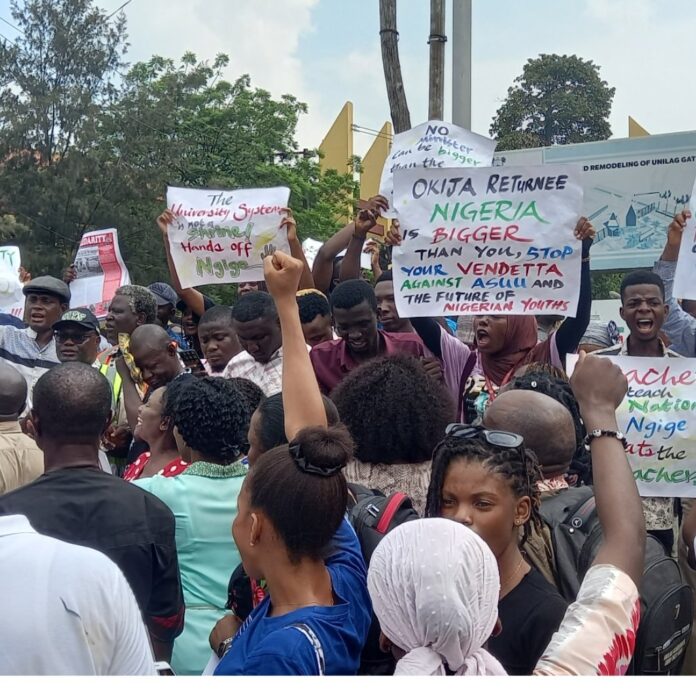The Academic Staff Union of Universities (ASUU) has issued a stark warning to the Federal Government (FG), signaling a potential nationwide crisis in the education sector in 2025. This comes after what the union describes as a year of neglect and unfulfilled promises in addressing critical issues plaguing Nigerian universities.
At the forefront of this renewed push is Professor Ayo Akinwole, chairman of ASUU’s University of Ibadan chapter, who accused the government of abandoning its responsibilities to public universities and university staff. “The uninterrupted academic calendar in 2024 was sustained by the sacrifices of ASUU members, not due to any meaningful contribution from the Federal Government,” Akinwole said in a statement on Wednesday.
ASUU’s grievances stretch back over a decade, rooted in unimplemented agreements and unmet funding commitments. Despite multiple negotiations, the government has failed to deliver on the provisions of the 2012 and 2013 Memoranda of Understanding (MoUs) and the 2017 Memorandum of Action (MoA). Key issues include:
- Revitalization of Public Universities: Funding for critical infrastructure, as outlined in past agreements, remains undisbursed.
- Outstanding Salaries and Deductions: Lecturers are owed three and a half months of withheld salaries, along with deductions for cooperative contributions, retirement schemes, and loan repayments.
- Earned Academic Allowances (EAA): Payment arrears continue to mount.
- Expansion of Public Universities: ASUU criticized the FG for establishing new universities without adequate funding provisions.
- Abandoned Visitation Reports: Recommendations from past panels remain unimplemented.
- IPPIS Issues: The Integrated Payroll and Personnel Information System (IPPIS), which ASUU opposes, is still in use.
Akinwole warned that the cumulative neglect could lead to another round of disruptions. “The failure to address these issues in 2024 has set the stage for a possible struggle in 2025, which could plunge the education sector into turmoil,” he stated.
The union also expressed concerns about the government’s controversial policies, including the new 18-year age limit for university admission, which Akinwole described as unrealistic and potentially harmful to access to education. He further condemned attempts to “commodify university education,” arguing that education should remain a public good accessible to all.
Citing the successful education models of countries like Germany, where tuition is free and adequately funded, Akinwole urged Nigeria to follow suit. “The attack on TETFund and the failure to meet UNESCO’s recommended budgetary allocation of 15 to 20 percent to education are glaring examples of misplaced priorities,” he said.
The union also pressed for better remuneration for academic staff, emphasizing that salaries for university lecturers should align with the African average. Akinwole drew attention to the stark contrast between current earnings and those stipulated in the 2009 FGN/ASUU Agreement. “In 2009, the salary for a professor was pegged at $3,000. Today, that figure is a mere $200, thanks to the continued depreciation of the Naira,” he lamented.
The ASUU chairman warned that the worsening economic conditions, coupled with inflation and a high cost of living, have eroded the working conditions of university staff, undermining their ability to deliver quality education.
Demand for Renegotiation
Akinwole called for the immediate implementation of the Nimi-Briggs-led renegotiated draft agreement, urging President Bola Ahmed Tinubu to prioritize resolving ASUU’s demands. He argued that a failure to act swiftly could exacerbate the crisis in Nigeria’s already strained education system.
“The welfare of workers in the education sector and Nigerian workers as a whole must be prioritized,” he said. “ASUU cannot continue to bear the burden of an underfunded education system.”
Setting the Agenda for 2025
As the union looks to the new year, Akinwole expressed hope that the government would adopt a more collaborative approach to resolving these issues. However, he warned that ASUU would not shy away from taking decisive action if the status quo persists.
“Having reviewed the state of education in Nigeria in 2024, it is time to set an agenda for 2025,” he said, adding that the union remains committed to advocating for a better education system.
Implications
ASUU’s latest ultimatum comes at a critical juncture for Nigeria, as President Tinubu’s administration grapples with widespread economic challenges and growing public dissatisfaction. Observers warn that a prolonged standoff between ASUU and the government could have dire consequences for the nation’s education system, which has already suffered from years of instability.
For students and parents, the stakes are particularly high. Any disruption in the academic calendar could further delay graduations and dampen public trust in Nigeria’s ability to provide quality education.

